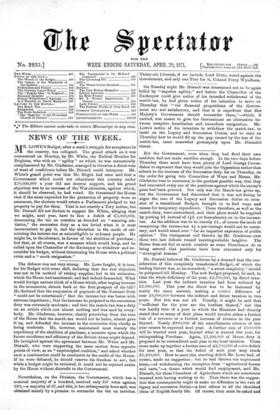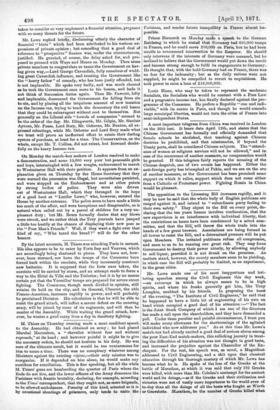Mr. Disraeli followed Mr. Gladstone by a demand that the
con- sideration of this completely transformed Budget, of which the leading feature was, as he remarked, "a sweet simplicity," should be postponed till Monday. The new Budget proposed, he said, to raise the whole deficiency of the year, /2,700,000, by direct taxa- tion. Last year the indirect taxation had been reduced by £3,000,000. This year the direct was to be increased by nearly the same amount, making a relative difference of near 16,000,000 between the indirect and direct taxation in two years. But this was not all. Usually, it might be said that "sufficient for the year are the burdens thereof," but this was hardly true of a year in which the Ministers had directly stated that so many of their plans would involve either a further loss of a revenue or a further increase of revenue in the year beyond. Nearly £900,000 of the miscellaneous revenue of this year cannot be expected next year. A further sum of £600,000 will be wanted next year, beyond what is wanted this year, for extinguishing Purchase. Again, £1,200,000 of House duty is proposed to be surrendered next year to the local taxation. These sums make up together a further sum of .£2,700,000 of extra deficit for next year, so that the deficit of next year may reach £5,400,000. • How to meet. this startling deficit Mr. Lowe had, of course, made no suggestion ; but he had thrown out unpleasant hints,—of withdrawing the exemption from "agricultural horses and carts,"—a theme which would find employment, said Mr. Disraeli, for those Chambers of Agriculture which are sometimes taunted with having nothing to do. Then there was the sugges- tion that consanguinity ought to make no difference in the rate of legacy and succession duties,—a hint odious to all the cherished ideas of English family life. Of course, time must be asked and
taken to consider so very unpleasant a financial situation, pregnant with so many threats for the future.



































